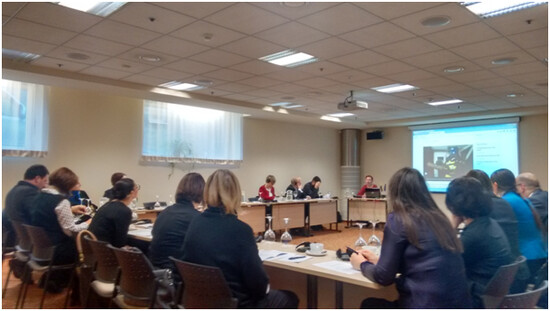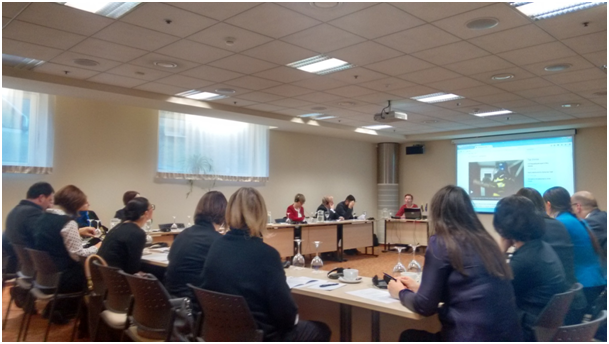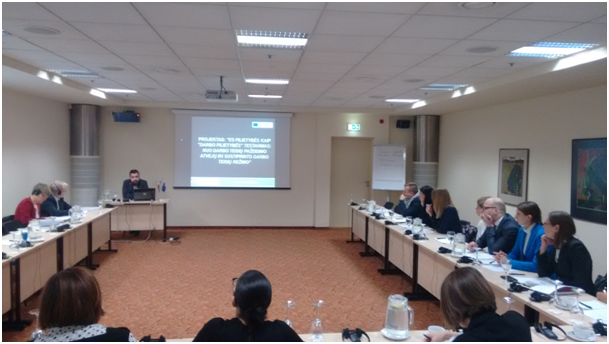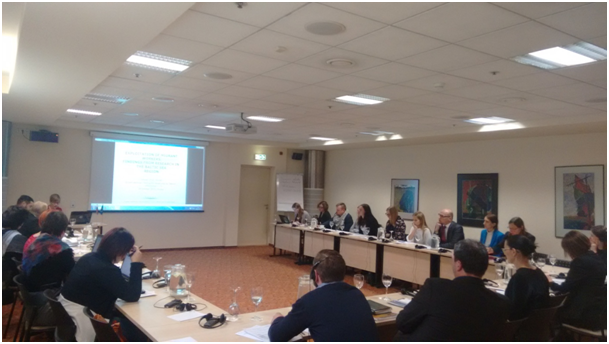Lithuania: Challenges and Solutions in Three Phases of Migration

Partner: Diversity Development Group
Location: Vilnius, Lithuania
Date: 29 and 30.10.2015
- Generally the recruitment procedures are purposefully unclear for both migrating workers and lawyers working on cases of labour rights violations;
- Long judicial processes in a case of severe forms of migrant labour exploitation;
- Inadequate (long) working hours without payment;
- Inadequate (informal) payment and-or Salaries not paid on time;
- Harassment, sexual harassment, violence, threats of violence at workplace;
- Hierarchies in a segmented labour market;
- Poor working and living conditions;
- Lack of social and psychological assistance as well as lack of legal representation for the victims of labour exploitation in the country of origin (lack of economic and social resources);
- Re-victimisation (as a consequence of lack of legal representation and social / psychological assistance);
- The issue of migrant labour exploitation is not a prioritised policy area in Lithuania (with the relation to both, immigration and emigration). This is related to the general political approach towards migration, (dual) citizenship and Diaspora policies;
- Poverty and social / economic vulnerability as well as exploitation in Lithuania as a basis for further exploitation in other countries;
- No system of international cooperation for identifying and representing victims in courts;
- Migrant labour exploitation as the area of activities for nongovernmental organisations and governmental institutions only in the country of destination. No political and social awareness in the country of origin – Lithuania;
- Lack of preventative mechanism (policies) and activities (fieldwork);
- Weak positions of trade unions (usually due to power relations between employers and employees).
All these challenges were structured in three problematic areas: pre-migration, migration and post-migration (return migration) processes. In addition, every process has ‘its own’ levels of analysis, where different obstacles were identified: macro level (structural: policies, legislative developments, socioeconomic situation), mezzo level (institutional/migration networks: ‘migration industry’, including migrant communities and (in)formal recruitment agencies) and micro level (individual: poverty, psychological situation, environment, where decision upon migration was made) (see scheme 1 below).

According to the data from preparatory activities and the second hearing, the most common economic sectors in which mobile Lithuanian citizens are exploited are construction and agriculture. However, there are other sectors, such as logistics and aviation, where mobile Lithuanian citizens are facing exploitation (for example, long working hours, inflexible workload, informal ways of receiving salaries, etc.). In general, as the second hearing revealed, most violations occurred in Ireland, UK, Spain, the Netherlands, Sweden, Germany, Czech Republic, Norway and Finland.
Gathered information helped to identify the portrait of a victim of labour rights violations: men of working age with a lack of language skills and significant indicators of social vulnerability. Vulnerability is considered as a risk factor for further exploitation in the labour market as well as a low potential of social mobility.
Three international experts were invited to take part in the second hearing: representatives from Gangmasters Licensing Authority (United Kingdom), Migrant Rights Centre (Ireland) and the European Institute for Crime Prevention and Control (Finland). Representatives from nongovernmental organisations presented specific cases of migrant labour exploitation. In addition, various national stakeholders from public authorities, research institutions, NGOs attended the second hearing.
In the first session, findings of the LABCIT project were presented. These reflections were followed by insights from the invited foreign experts who shared their work experience on labour migrant violation cases: introduced activities of organisations, identified patterns of violations, weaknesses of the system, etc. They supported testimonies of migrant workers on the scope and severity of the violation of their labour rights.
- Pre-migration–experts confirmed that migrant workers lack knowledge of their labour rights; usually, migrants experience language obstacles, which creates more space for exploitation and less space for self-representation. In addition, usually migrant workers are unaware of working and living conditions, which, after arrival to the country of destination, seems to be much worse than expected due to deliberately unclear recruitment procedures. Moreover, migrant workers do not have enough information about labour contracts and employers and often do not know for which company they are employed and who is responsible for payments and working/living conditions.
- Regarding the phase of migration/settlement, there was an intense debate on the role and responsibilities of both local organisations that regulate labour relations (such as labour inspectorates) and labour migrants themselves. NGO representatives emphasised the lack of involvement of local organisations in identifying particular violations; for example, collective and resonant cases are identified (such as in the UK), while other cases are not. At the same time it is very difficult or even impossible to proceed with certain cases without support from the victims (migrants), who are usually afraid to push particular cases forward to court procedures.
- The consensus was that it is almost impossible to identify the cases of labour rights violations after migrant return to the country of origin, unless the migrant seeks assistance and legal representation. There is no system for identifying victims of labour rights violation after they come back to Lithuania. Due to the lack of awareness, only a limited number of victims receive assistance. There is a significant co-operation gap between police and experts as well as a general lack of awareness of the workers’ issues. The first steps of improvement would be the establishment of counselling centres for victims strengthening cooperation between labour inspectorates, law enforcement agencies, NGOs and social workers.
Summary of Hearing II Procedures from the other partners countries are available here.




The information on this web page reflects only the authors’ views. The Education, audiovisual and Culture Executive Agency and the European Commission are neither responsible nor liable for any use that may be made of the information contained on this web page.